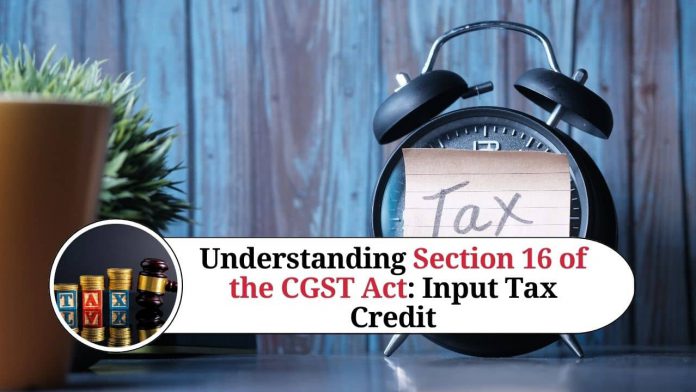The Central Goods and Services Tax (CGST) Act, 2017 was enacted to regulate the taxation of goods and services in India. One of the key provisions of the Act is Section 16, which deals with an input tax credit. The input tax credit is a mechanism through which taxpayers can claim a credit for the tax paid on inputs used in the production of goods and services.
What is Input Tax Credit?
Input tax credit (ITC) is the credit that a registered taxpayer can claim for the tax paid on the inputs used in the production of goods and services. The tax paid on inputs is deducted from the tax liability of the taxpayer. ITC is available for taxes paid on goods and services purchased for business purposes.
Conditions for Availing Input Tax Credit Section 16 of the CGST Act lays down certain conditions that must be met to claim the input tax credit. Some of the key conditions are as follows:
- The taxpayer must be registered under the CGST Act.
- The inputs must have been used or intended to be used in the course or furtherance of business.
- The tax invoice or any other prescribed document must be available to the taxpayer.
- The supplier must have filed the GST returns and paid the tax due to the government.
Input Tax Credit on Capital Goods Input tax credit is also available for capital goods, which are goods used in the production of other goods or services
The input tax credit for capital goods can be claimed in a phased manner over some time. The taxpayer can claim the full credit in the year of the purchase or avail it in parts over the useful life of the capital goods.
Blocked Input Tax Credit Section 17 of the CGST Act lists certain cases where the input tax credit is not available to the taxpayer. These cases are known as blocked input tax credits. Some of the items that are not eligible for the input tax credit are motor vehicles, food, beverages, membership in a club, etc.
Reversal of Input Tax Credit In certain situations
the input tax credit that has been claimed by the taxpayer needs to be reversed. For example, if the taxpayer has not paid the supplier for the inputs within 180 days of the invoice date, the input tax credit must be reversed. Similarly, if the inputs are used for personal purposes or are lost, destroyed, or stolen, the input tax credit must be reversed.
Final Conclusion:
An input tax credit is an important mechanism for taxpayers to reduce their tax liability. Section 16 of the CGST Act lays down the conditions for claiming the input tax credit. Taxpayers must ensure that they meet these conditions to avoid any penalties or interest. It is important to understand the provisions of the Act to ensure compliance with the law.
Read more useful content:
Section 16 of the Central Goods and Services Tax (CGST) Act, 2017, deals with the provisions related to the eligibility and conditions for taking input tax credit (ITC). Here are some frequently asked questions (FAQs) on Section 16 of the CGST Act:
Q: What is an input tax credit (ITC)?
A: Input tax credit (ITC) is the credit that a taxpayer can claim for the taxes paid on the purchase of goods or services used for business purposes.
Q: Who is eligible to claim an input tax credit (ITC)?
A: Any registered person under the GST regime who has paid the tax on the purchase of goods or services used for business purposes is eligible to claim the input tax credit.
Q: What are the conditions for claiming input tax credit (ITC)?
A: The following are the conditions for claiming input tax credit:
- The taxpayer must be registered under the GST regime.
- The goods or services for which the credit is claimed must be used for business purposes.
- The taxpayer must possess a tax invoice or debit note issued by the supplier.
- The tax charged on the invoice must have been paid to the government by the supplier.
- Taxpayer must file their GST returns on time.
Q: Can a taxpayer claim input tax credit (ITC) for the taxes paid on goods or services used for personal purposes?
A: No, a taxpayer cannot claim an input tax credit for the taxes paid on goods or services used for personal purposes.
Q: Can a taxpayer claim input tax credit (ITC) for the taxes paid on goods or services used for exempt supplies?
A: No, a taxpayer cannot claim an input tax credit for the taxes paid on goods or services used for exempt supplies.
Q: What is the time limit for claiming input tax credit (ITC)?
A: The time limit for claiming input tax credit is the earlier of the following:
- The due date for filing the GST return for September of the following financial year.
- The date of filing the annual GST return.
Q: Can a taxpayer claim input tax credit (ITC) for the taxes paid on goods or services received in a financial year but accounted for in the next financial year?
A: Yes, a taxpayer can claim an input tax credit for the taxes paid on goods or services received in a financial year but account for in the next financial year, provided that the invoice or debit note is received within the due date of filing the GST return for September of the following financial year.
Q: What happens if a taxpayer claims an input tax credit (ITC) that is not eligible?
A: If a taxpayer claims an input tax credit that is not eligible, they will have to pay the tax along with interest and a penalty equal to 100% of the tax amount claimed as an input tax credit.




















